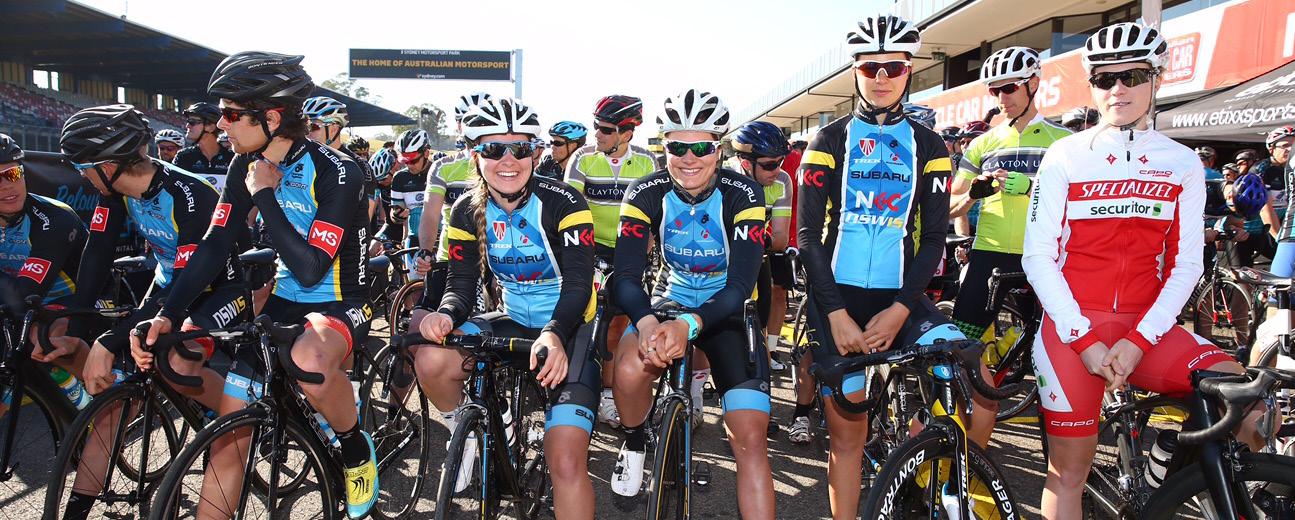
25 minute read
2016 Below the Belt Pedalthon
ANZUP in Below the Belt action
Will you join us this year?
The ANZUP Below the Belt Pedalthon is a race for riders of all levels and from all walks of life.
This great race welcomes all, from pharma, large corporates, small business, hardworking police, firies and Olympic cyclists all lined up in lycra on the starting line All there to help beat urogenital cancers, with all funds raised going to Below the Belt Research Fund. Of course it’s incredibly important we have ANZUP members as part of the race, and there’s nothing better than seeing familiar faces joining us on the track. Last year, we were delighted to see synergised group of ANZUP members from different areas join us on the day and race around the track. “It is a great personal fitness challenge. Whether you are a serious cyclist or just enjoy a relaxed pedal on the weekend the event will motivate you to get out on your bike and train. It’s also a chance to ide on a beautiful, smooth, wide road without traffic. That’s something most Sydney cyclists don’t get to do often…the free massage at the end was also a highlight!” KAREN BRACKEN ANZUP member and rider
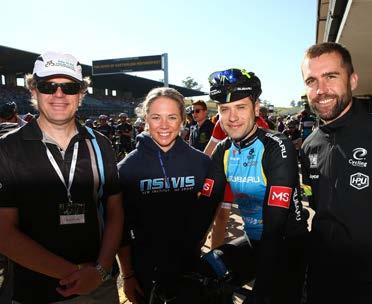
“To think that everyone cared so much to come together to help people suffering from below the belt cancers… It’s a great opportunity to fundraise for a very important cause, but also to challenge yourself, have fun, and make new friends.”
SUPPORT ANZUP!
NO REGISTRATION FEE!

PETER GRIMISON ANZUP member and rider As part of team ANZUP, we waive the registration cost of your ride. Instead we ask you just do your best to fundraise through your networks. If you have any questions contact lucy.byers@anzup.org.au. It’s time to get ready to race!
Register Now [https:// belowthebeltpedalthon2016. everydayhero.com/au/sign-up]
UPDATES FROM SAC & SUBCOMMITTEE CHAIRS
Scientific Advisory Committee (SAC)
The ANZUP Scientific Advisory Committee comprises a broadbased membership ensuring that we have appropriate representation of disciplines in our decisionmaking and strategic processes. The SAC reviews trial concepts and prioritises them according to ANZUP’s strategic direction. It was very valuable in November 2015 to have a faceto-face meeting of the SAC to think about strategic planning and how the SAC can work most effectively in the future. This has resulted in a change to the meeting agenda to ensure we dedicate time each meeting for these purposes.
The SAC has met twice by teleconference during 2016 and also had its annual face-to-face meeting at the ASM on 10 July 2016, open to all ANZUP members. This is a great opportunity for all of us to see how the SAC is thinking and working. We are very grateful to all our SAC members for their contributions to ANZUP’s work. Since the last UPdate newsletter the chair of the Correlative and Translational Research Subcommittee, Paul De Souza, stepped down from his role. The subcommittee members were asked to nominate people for the chair and deputy chair roles. As a result Arun Azad has now been appointed as chair and takes a place on the SAC; Anthony Joshua is the new deputy chair. Thank you to both of them for taking on this new role. I stepped down as chair of the Renal Cell Subcommittee and Craig Gedye has now been elected chair, with David Pook continuing as deputy. Thanks to both of them also.
The SAC recently undertook a formal process of reviewing and ranking the applications for the joint ANZUP/PCFA funding scheme for prostate cancer trials. It is important to have a broad base of expertise in this process as well as fairness and transparency, and I thank the SAC members who participated.
IAN DAVIS Chair, Scientific Advisory Committee
INTELLIGENT NEWS
THESATURDAYPAPER.COM.AU
The ANZUP bladder cancer subcommittee continues to make steady progress with its core businesses of conceiving, developing, supporting and performing clinical trials in bladder cancer. Catching up face to face with colleagues at the ASM always reinvigorates the group and provided a great opportunity to recruit new support to current and future planned trials. The upcoming concept development workshop should further consolidate new ideas discussed at the meeting as well as developing existing concepts already in the subcommittee pipeline.
Trial Updates Recruiting Trials
BCGMM: Addition of mitomycin to BCG in high risk non muscle-invasive bladder cancer.
10 sites open: Recruitment 76
A face to face trial management committee meeting at the ASM in Brisbane provided a perfect opportunity to iron out issues relating to recruitment at open sites and troubleshoot problems affecting planned sites which have yet to open.
With the BCG shortage issues now behind us, a period of accelerated recruitment is anticipated. The efforts of the group to have continued to successfully recruit this trial despite, the previous problems with BCG supply not to mention funding shortfalls, is a testament to the dedication of its members.
A further funding application for the stage 2 of the study will be submitted in the next funding round. Now is the time for members with translational concepts which might run alongside the second stage of trial, to bring those important ideas forward.
BL-12: NAB Paclitaxel vs Paclitaxel in patients with advanced urothelial cancer progressing on or after a platinum containing regimen 18 Australian sites open: Australian recruitment 23
This multicentre randomised phase II Collaboration with Canadian cancer Trials Group continues to recruit well in Canada and Australia. Overall, 145 of the target of 199 patients for Australia and Canada had been recruited. The trial was likely to be open for another year and more sites are still required.
RAIDER-B: Examining adaptive external beam radiotherapy techniques in the treatment of muscleinvasive bladder cancer.
3 of 12 planned ANZ sites open: First Australasian patient recruited in New Zealand
The international multi-centre collaborative study continues recruiting well through the MRC in the UK and has commenced accrual in ANZ.
PCR-MIB: Pembrolizumab with ChemoRadiotherapy as treatment for Muscle Invasive Bladder Cancer.
This novel phase 1 non-randomised study of 30 patients over 2 years funded by Merck will examine the feasibility and tolerability of the addition of this PD-1 inhibitor to chemo-radiation. 5 sites across NSW, VIC, and WA are anticipated to open in the next couple of months.
Patient Reported Symptom Index in Non Muscle-Invasive Bladder Cancer
This study co-badged with ANZUP will develop a new QoL tool for NMIBC. Ethical and site approvals are underway and work towards developing the symptom index (SI) has begun. Testing the SI will be in two phases: qualitative interviews to pretest the draft SI, and large scale field testing (multi-centre).
Concepts ACCEPT: Advancing Cystectomy Care – an Enhanced Recovery Pathway Trial (ACCEPT)
ACCEPT aims to develop and introduce an evidence and consensus based Enhanced Recovery Pathway (ERP) for cystectomy care across multiple ‘high volume’ cystectomy sites in ANZ. An ANZUP survey informed
the content of the ERP and initially a collaborative multi-centre audit is planned. The data set has been defined and the data collection tools developed. Ethical approvals are currently being sought. Once the ERP and data collection is established a prospective trial with randomized interventions in peri-operative cystectomy care may be possible.
Targeting the AR in Bladder Cancer
This novel target continues to generate interest within the sub-committee whilst the practicalities of feasibility of a clinical trial design possibly in collaboration with an industry sponsor are being determined.
DICKON HAYNE Chair, Bladder Cancer Subcommittee
Germ Cell
Phase III RCT of Accelerated BEP (plus translational sub study) - open at 28 sites and 26 patients recruited.
This randomised trial of chemotherapy with accelerated BEP versus standard BEP for patients with intermediate or poor-risk advanced germ cell tumours is supported by Cancer Council Australia and Cancer Australia, and is currently open at 28 ANZ sites. 26 patients have been recruited. We continue to work with collaborators to open the study in the UK and USA with collaborators from Cambridge Clinical Trials Unit and Children’s Oncology Group. Version 3.0 of the protocol, which allows recruitment of paediatric patients aged 11 years and over, and female patients, has been approved at 10 sites. We are liaising with the Australia New Zealand Gynaecological Oncology Group and the Australian and New Zealand Children’s Haematology/ Oncology Group to promote recruitment of paediatric patients and patients with FIGO stage IV ovarian germ cell tumours. If you have any questions in relation to this study, then please email mailto:p3bep@ctc.usyd.edu.au.
Important evidence-based recommendations for the follow-up of stage I testicular cancer have been approved by the ANZUP Scientific Advisory Committee and Consumer Advisory Panel, and are now available for use. A clinician guideline, patient handout, and excel calculator which generates a personalised schedule have been developed by Andrew Weickhardt, Nicola Lawrence, Annie Yeung and Fritha Hanning; with the assistance of the ANZUP Germ Cell Subcommittee and Consumer Advisory Panel. It is hoped that the recommendations will reduce unnecessary variance and radiation exposure in this group of patients.
Current concepts in development
Concepts in development include: - e-TC 2.0: a prospective study of an eHealth intervention for TC survivors led by Drs Ben Smith and Louise
Heniger in collaboration with PoCoG, building on the successful e-TC study - a surgical study for stage II seminoma, led by Drs
Shomik Sengupta and Manish Patel - an immunotherapy study for chemotherapy-refractory germ cell tumours
G3 Meeting, Chicago, June 2016
A number of germ cell subcommittee members attended the Global Germ-Cell Cancer Group (G3) seventh annual meeting during the American Society of Clinical Oncology Annual Meeting in June 2016. A number of projects were discussed, including:
- the IGCCCG update initiative (to which ANZUP is contributing data, led by A/Prof Guy Toner and Dr
Nicola Lawrence)
- Dr Ben Tran’s venous thromboembolism validation study - a registry for palliative treatment in germ cell tumours - registries for unusual clinical scenarios in seminoma including relapse after adjuvant carboplatin, very high
BHCG tumour marker titres, and post-chemotherapy
PET-positivity Please contact me if you would like contacts to contribute to these studies.
Malignant Germ Cell International Consortium (MaGIC) Meeting, Cambridge, June 2016
Peter Grimison attended the MaGIC meeting in Cambridge UK, which was convened by members of the Children’s Oncology Group (USA) and Children’s Cancer and Leukaemia Group (UK), and chaired by Dr Lindsay Frazier from Dana-Farber Cancer Institute, Boston USA. Members are active in both clinical and translational studies, and enthusiastic to increase collaborations with ANZUP and other adult cooperative groups on protocols. The GCT explorer was presented. This clinical and translational database was developed at Southwestern University Texas USA; and is suited to large scale collaborative translational studies. MaGIC also plan a larger conference focussing on germ cell tumours.
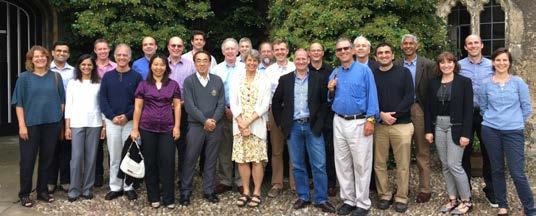
Movember is generously supporting ANZUP’s participation in the TIGER study. This very important international randomised trial for refractory and relapsed germ cell tumours, of high-dose chemotherapy with TI-CE versus conventional dose chemotherapy with TIP, is led by Alliance. ANZUP continues to work with the CTC and Alliance to open the study at 6 ANZ sites later in 2016.
ANZUP also continues to work with Movember on their GAP5 Translational Research Project, which is a translational project that aims to identifying the biological drivers of relapse in this cohort of men. It is hoped that the final research plan will give ANZUP and its Australian collaborators the opportunity to participate in this important research.
Updates from studies in follow-up
Chemotherapy and Cognition: Prof Ian Olver presented an abstract on behalf of the study team at the 2016 American Society of Clinical Oncology Annual Meeting, Chicago, June 2016, for this study which prospectively monitored cognitive function in patients managed with and without chemotherapy for testicular cancer. Conference delegates were reassured that the study found no significant adverse cognitive effects of chemotherapy at 12 months following treatment, however were cautioned to interpret results with caution given the limited sample size. A manuscript is in preparation.
Phase II study of accelerated BEP for advanced germ cell tumours: An updated analysis was conducted by Drs Andrew Martin and Nicola Lawrence at a median follow-up of 6 years found no further relapses, but 2 further deaths – one related to known disease progression, and one unrelated to disease or treatment. These encouraging results are being presented as an oral abstract at the ANZUP Annual Scientific Meeting, Brisbane, July 2016 and Medical Oncology Society of Australia Annual Scientific Meeting, Gold Cost, August 2016. A manuscript has been submitted.
Call for new members
Prostate
members including trainees who will contribute to research activity. Please encourage your interested colleagues and trainees to join the sub-committee. We are a multi-disciplinary group, and we encourage participation of members not only from medical oncology, but also from surgery, radiation oncology, nursing, psycho-oncology, and basic science. Again I thank the efforts of investigators, staff from ANZUP and the CTC, and patients for these achievements.
PETER GRIMISON Chair, Germ Cell Subcommitte
The prostate subcommittee continues to be buoyed by exciting funding developments and our ongoing study progress.
The recent announcement of the ANZUP-PCFA Partnership Grant initiative has stimulated a lot of trial concept activity for the group. This initiative has secured up to $1.5M over 3 years to support what we often find so frustrating in the clinical research arena – that of finding the seed funding to develop concepts into early phase clinical trials which are then competitive going forwards.
ANZUP held a full-day Concept Development Workshop in May, working through 10 concepts ranging from initial diagnosis through to advanced disease, including imaging and translational ideas. Ultimately, after robust discussions on the day and further assessment by as scientific panel, it was decided to move forward with a new therapeutic approach based on the concept “A prospective phase II randomised controlled of Lutetium-177 PSMA radionuclide therapy”. Extensive follow-up discussions have already been undertaken around this, with the first face to face protocol development working group meeting being held later this month. While resources have been committed to this study, we are very keen to see the other ideas prosper with ongoing support from the committee members. We anticipate that many will progress through the subcommittee in the near future. Our open studies continue to be very dynamic. ENZAMET remains the stellar performer, with 734 patients enrolled (of 1100). A few concepts are trickling in around what to do with the extensive bank of translational samples that will be available from this study. I encourage everyone to think through and submit ideas they may have in this respect. The big question for ENZAMET now is what to do next!
ENZARAD has also recently seen our biggest accruing months. 270 men (of 800) are enrolled now, and this should be boosted by the recent final ratification of the protocol by EORTC. Several large European sites should open soon, along with a number of UK sites, which all bodes well.
The Pain-Free TRUS-B study is now activated across six centres and 15 men have been randomised. The purpose of this trial is to determine whether the addition of inhaled methoxyflurane to local anaesthesia improves the pain, discomfort and experience of TRUS biopsy. The recruitment aim is 420 patients.
Several concepts continue to be developed in the committee, and we encourage the proposal of new concepts. A number of studies have also been reviewed for consideration of co-badging with the members providing useful feedback on these as they come through. As always, I remind everyone to prod any colleagues with a prostate cancer interest to join and contribute.
SCOTT WILLIAMS Chair, Prostate Cancer Subcommittee
The RCC subcommittee teleconference on 6 May 2016 was my first as chair, and was well attended with robust discussion. Thanks to all who called in and a very big vote of thanks to Ian Davis who has been chairing the RCC subcommittee since ANZUP’s inception; big shoes to fill.
Previous RCC trials that ANZUP has run including SORCE and EVERSUN were discussed. One patient remains on EVERSUN, and a number of patients remain on observation in SORCE. There has been a lot of activity in the RCC subcommittee over the last few months, with four clinical trial protocols shaping up.
KEYPAD is a single-arm, phase II trial of pembrolizumab and denosumab in pre-treated advanced clear cell renal cell carcinoma, in the second-line following progression through VEGFR TKI. 70 patients will be recruited to examine the effect of adding RANK inhibition to immunotherapy. RANKL is expressed by tumour associated macrophages and by ccRCC tumour cells themselves, suggesting that it is an additional mechanism of immunoevasion in these patients. A suite of biomarker studies are planned in conjunction with the study, so a baseline tumour specimen and on-treatment blood tests are an essential part of the protocol. This protocol has been provisionally approved by both MSD and Amgen and we are working hard with the NHMRC CTC to complete logistics. We hope to have the trial open before the end of 2016.
UNISoN is a sequential cohort trial of nivolumab alone, followed (if needed) by ipilimumab + nivolumab in patients with advanced non-clear cell RCC. Clear cell RCC and urothelial cancer are excluded, but patients with any other histology may be eligible. Two-weekly nivolumab will be offered to all patients; if this is unhelpful i.e. their cancer progresses, and they remain well they may reconsent for treatment with ipilimumab + nivolumab, followed by nivolumab maintenance. The trial is powered to observe a response rate in this second cohort of patients, and so up to 95 patients in all may be recruited. Again, a suite of biomarker studies are planned in conjunction with the study, including a mandatory on-treatment tumour biopsy at nivolumabalone progression, to compare to a baseline tumour specimen. While it is challenging to re-biopsy patients in a clinical trial, this second sample before eligible patients start the second cohort of treatment (ipi/nivo) will help predict future patients who will be resistant to nivolumab or ipi/nivo, sparing them futile treatment. This protocol is in late stages of development and about to be formally submitted to BMS for funding.
RAMPART is the long awaited sequel to SORCE. Ian Davis and Martin Stockler have been involved in the development of this study for some years, and with the protocol firming up, the Renal Adjuvant Multiple Arm Randomised Trial is ready for public discussion. This is a multi-stage multi-centre randomised controlled platform trial international phase III trial of adjuvant therapy in patients with resected primary renal cell carcinoma (RCC) at high or intermediate risk of relapse. The MRC UK is leading the study, but given ANZUP’s substantial contribution to SORCE, we have been invited to participate from the outset. The trial will have three arms:
– Arm A: active monitoring for 1 year
– Arm B: durvalumab (anti-PD-L1) for 1 year
– Arm C: durvalumab for 1 year + tremelimumab (anti-
CTLA4) x 2 doses
Co-primary endpoints are DFS and OS. The trial is well powered to show the proposed benefit of checkpoint immunotherapy in this disease with 1750 patients expected to be enrolled. ANZUP is represented on the Trial Development Group but also on the TRANSRAMPART translational group examining substudies.
Finally, FASTRACK II is a trial of Focal Ablative Stereotactic Radiosurgery for Cancers of the Kidney, a Phase II Clinical Trial Scientific. This multicentre phase II clinical trial of stereotactic ablative body radiotherapy for primary kidney cancer is being led by Shankar Siva and is a TROG led study, but intergroup co-operative agreements have been drafted to cobadge this as an ANZUP trial. A pilot phase (20 patients) is about to start at the Alfred, Austin, Calvary
Mater Newcastle, RAH, Peter Mac, Princess Alexandra, and Royal North Shore pilot sites. Study start-up planned July 2016. An NHMRC funding application for full study funding has been submitted.
While this represents a lot of activity, we are keen to develop further proposals and ideas for patients with kidney cancer, and we welcome you to attend the RCC Concept Development Workshop, on Wednesday 17 August 2016, at Level 5 Boardroom, Lifehouse Building, 119 – 143 Missenden Road, Camperdown NSW. The CDW is designed to facilitate and support members who actively contribute on a regular basis both in our teleconferences and across our research activities who have an idea or concept they would like to put forward for discussion and, if supported, to further develop into a future grant application. Funding is available to support successful applicants’ attendance should this be required. As noted above we hope to have trials in second-line for clear cell RCC, and first-line for non-clear cell, so put on your thinking caps for a first and third line trial for metastatic clear cell RCC in particular. Please don’t hesitate to contact me should you have any questions or queries.
Thanks once again for your interest and support for kidney cancer patients in Australasia – we have a number of options for patients’ treatment, but we are excited about examining new opportunities to improve their lives.
CRAIG GEDYE Chair, Renal Cell Cancer Subcommittee
Correlative and Translational Research
The Correlative and Translational Research (C & TR) Subcommittee is undergoing significant changes. I am the new Chair and will be ably supported by A/Prof. Anthony Joshua, our new Deputy Chair. I am a medical oncologist and translational researcher based at Monash Health and Monash University. I recently returned from a prostate cancer fellowship in Vancouver with Prof. Kim Chi and am very excited to be taking on this leadership role with the C & TR Subcommittee.
My goals as Chair are to: 1. Ensure that the C & TR Subcommittee is centrally involved at an early stage in the design of translational studies for all ANZUPled clinical trials; 2. Promote and support clinical trials with translational outcomes as the primary endpoint; and 3. Engage with similar translational committees attached to our international partners and cooperative groups. To achieve these goals, we will be assembling a multi-disciplinary working group comprising the best uro-oncology translational researchers in Australia. Of course, all of our activities including subcommittee teleconferences will remain open to all ANZUP members.
Our planned new activities of course complement ongoing biospecimen collection for exisiting ANZUP trials including P3BEP, BL-12, ENZAMET and ENZARAD.
I look forward to bringing you more updates on the C & TR Subcommittee and reporting on all the new and exciting activities that we have planned. We also plan to hold a translational meeting at the 2017 ANZUP ASM. More details to follow.
ARUN AZAD Chair, Correlative and Translational Research Subcommittee
Quality of Life and Supportive Care
Exciting times in the QOL subcommittee, during our Strategic Planning meeting in April this year we identified a number of messages about our subcommittee that we wanted to share, along with concepts to work on.
First up, the QOL subcommittee is interested in any research and/or interventions with potential to alleviate the impact of UG cancer and its treatments on people living with the disease. Our aim is to not just comment on inclusion of QOL and patient-reported outcomes in ANZUP treatment trials, but develop and run symptom management and supportive care trials.
Two priority areas identified for follow-up were adherence to treatment(s) and the role of physical activity. In talking about adherence want to know:
What is the adherence to anti-cancer treatments in GU & Prostate cancer disease groups?
What is the adherence to supportive care recommendations in people on active treatment?
What is the adherence to lifestyle advice?
What are the factors impacting adherence?
Where are we best to intervene?
We are working up initial concepts in this area at the moment and are looking forward to sharing these for feedback over the next few months as the ideas crystalise.
Recently, physical activity as a potential moderator of fatigue was considered. The group is very committed to exploring opportunities to incorporate physical activity interventions into the group program and our ongoing trials. Right now what we are aiming to do is determine what programs could be implemented now and what the outstanding questions about exercise in our populations are. Doing this will help enhance the infrastructure available to support physical activity in the clinic and community, as well as the interventions that are feasible to delivery in practice and trials.
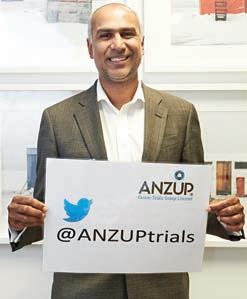
Living Well with Prostate Cancer
The NHMRC-funded Living Well with Prostate Cancer Project successfully trialled a mindfulnessbased cognitive therapy group intervention over the telephone for men with advanced prostate cancer. A total of 190 men were recruited and 14 mindfulness groups were run over the course of the project, with each group containing an average of 6 men. Men were followed-up over the course of nine months and intervention outcomes have been analysed. A manuscript has recently been accepted for publication in the peer review journal, Quality of Life Research [1] . This manuscript examines the relationship between mindfulness skills and distress at baseline of the trial. A manuscript publishing outcome data from the trial is currently under peer review. If you would like any more information about the project, please contact the Project Manager, Dr Melissa Legg, on (07) 3634 5191 or email melissalegg@cancerqld.org.au.
SUZANNE CHAMBERS Chair, Quality of Life and Supportive Care Subcommittee
1. Chambers SK, Foley E, Clutton S, McDowall R, Occhipinti S, Berry M, Stockler MR, Lepore SJ, Frydenberg M, Gardiner RA, Davis ID, Smith DP. The role of mindfulness in distress and quality of life for men with advanced prostate cancer. Quality of Life Research 2016. Available at http://link.springer.com/ article/10.1007/s11136-016-1341-3
Did you know ANZUP is now tweeting to over 1000 followers?
Our community are sharing trial updates and news across Twitter. We’re always interested in retweeting your thoughts, stories and insights with the rest of our followers. At our ASM in July our #ANZUP15 thread made over 1.2 million impressions in 3 days. Follow @ANZUPtrials and start communicating with leading professionals today.
Consumer Advisory Panel (CAP)
The opportunity for the CAP to be part of ANZUP’s Annual Scientific Meeting is invaluable, because it means we are better placed to support ANZUP’s research activities from a consumer perspective. The Sunday saw a full day of activity for the CAP and while I was busy winging my way from Melbourne after a wedding on the Saturday night, Ray opened and welcomed everyone to the CAP Education Session. We were sorry that John Stubbs and Tony Sonneveld (both long standing CAP members) were not able to join us. In particular we send Tony our best wishes as he continues to undergo treatment for his advanced prostate cancer. Ian Davis kicked off the program with an overview of ANZUP’s 2016-2018 strategic plan. Leonie Young then presented on consumer representation in clinical trial research; an excellent reminder for even the more experienced members of the scope of our role. We thank Leonie who continues to work with our CAP sharing her vast experience as a consumer advocate of many years in this space and in her current role as CAP Chair of the ANZBCGT.
We continued with presentations on translational research and what it means, making sense of the dollars in cancer trials, and the Quality of Life office explaining their role and how they work with ANZUP. We welcomed Haryana Dhillon, Deputy Chair of ANZUP’s Quality of Life and Supportive Care subcommittee, who spoke to us about some research ideas focused on patient adherence to treatment and the role that exercise can play in improving patient outcomes. With the recent change of faces within the CAP team, we put aside last year’s idea for a CAP project so we could focus on building a team. With the new members on board the CAP considered how we can work more closely with the ANZUP membership to continue to educate the community on the benefits of clinical trials.
In the coming months we will scope out a project in line with ANZUP’s strategic plan of increasing its profile and engagement with the community. For our last, but certainly not least, session Ian Davis presented his Concept Outline and Patient Information and Consent Form on the Effectiveness of Topical Broccoli in Big Toe Cancer. It was a humorous but educational presentation covering an important reason for the CAP being involved with ANZUP. We came away knowing there is much that we can do in the months ahead as we have the opportunity to progress some of our thoughts and ideas.
The Sunday was all about the Community Engagement Forum. I commend Marg, her team and ANZUP’s Brisbane members who drove this event. The presentations were greatly appreciated by the audience and we had some wonderful feedback. We thank all the presenters who freely give up their time and make the day successful and informative.
The Sunday finished with welcome drinks and the CAP dinner; an annual face to face catch up for shared experiences and ideas. As a group we respond enthusiastically and always meet the timelines. We strongly believe in what we do and are happy to support the ANZUP membership in any way we can. We thank Ian Davis, the ANZUP Board, and especially Marg and her team for making us feel welcome and valued. The CAP is very much looking forward to another busy and successful year ahead.
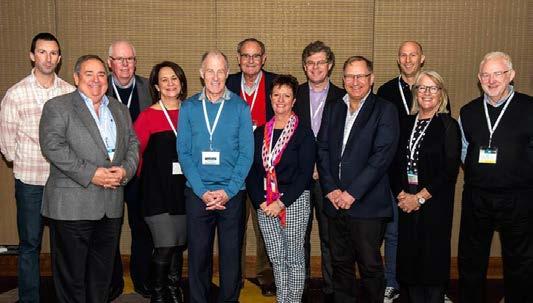
CONSUMER ADVISORY PANEL, ANZUP ASM 2016
BELINDA JAGO Chair, Consumer Advisory Panel
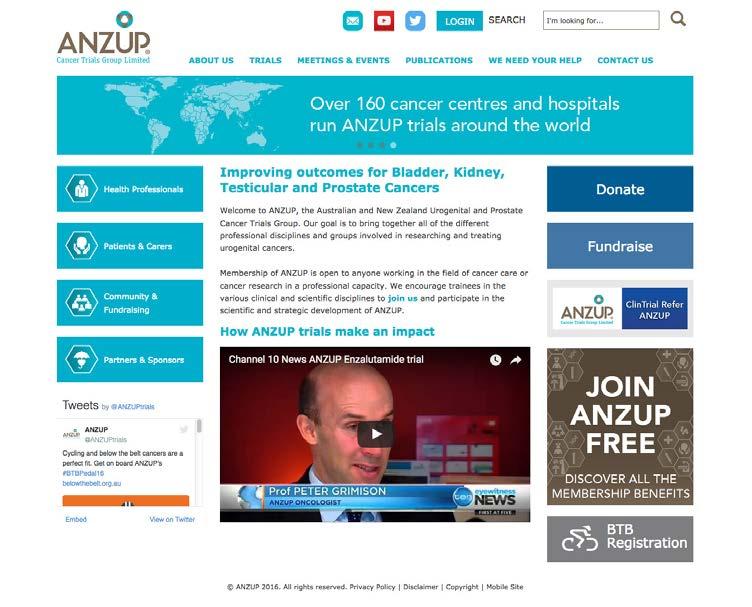
New ANZUP website
The ANZUP website is the hub for much of the organisation’s activity. In late 2015, the ANZUP team began looking at updating the website. Working with two agencies the updates include:
- A new professional design, look and feel - Navigation options for members, patients, community and supporters - Mobile responsive and easy to navigate from smartphones. - Greater access to resources for members, subcommittees and trial groups. - Integrating our new content management software
The ANZUP website has now been launched and can be seen live right now.
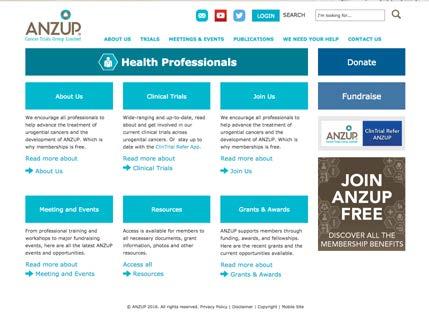
VISIT THE ANZUP WEBSITE





